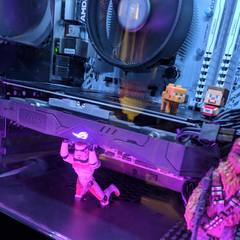NVMe slower than SATA
Go to solution
Solved by BondiBlue,
1 minute ago, WiiMAN said:Yeah the SATA is being boosted. But the NVMe is performing as expected? No need to adjust anything?
Yes, it looks fine to me. It's many times faster than the actual speeds of your SATA drive.
-
Featured Topics
-
Topics
-
0
-
3
-
0
-
1
-
4
-
1
-
JFRStudent ·
Posted in Photography and Videography1 -
5
-
6
-
amir2927 ·
Posted in CPUs, Motherboards, and Memory9
-
-
play_circle_filled

Latest From Linus Tech Tips:
I Am Not Buying A Super Computer - WAN Show May 3, 2024















Create an account or sign in to comment
You need to be a member in order to leave a comment
Create an account
Sign up for a new account in our community. It's easy!
Register a new accountSign in
Already have an account? Sign in here.
Sign In Now